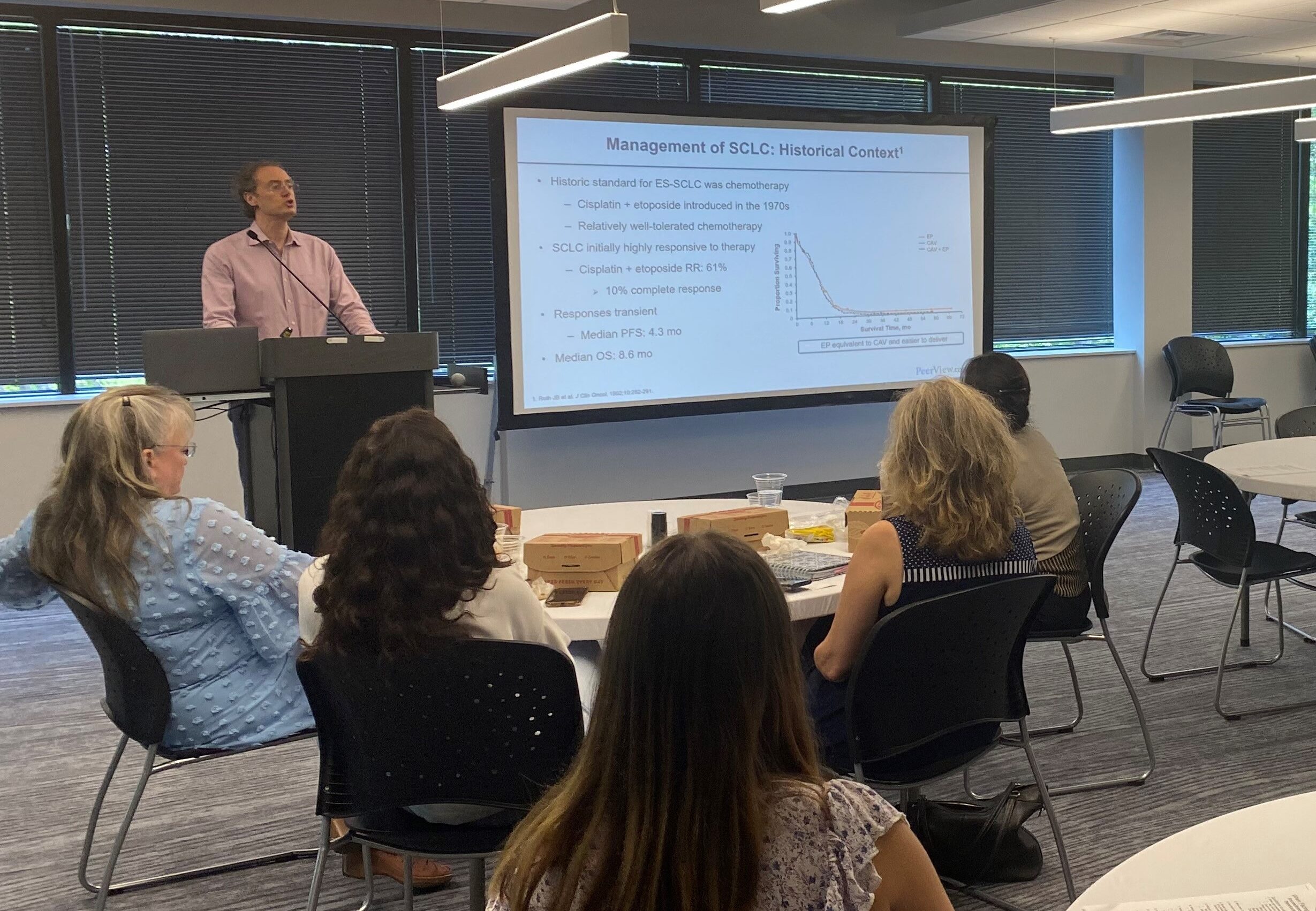LCI Community Education Presents Updates on Current Treatments in Lung Cancer and Exciting Developments in CAR-T Research for Lung Cancer

By: Susan Kjellqvist, Director of Development
Watch the recorded presentation, “Current Treatments and Challenges” in Lung Cancer below
On July 22, LCI hosted a Community Education event at the offices of G1 Therapeutics in Research Triangle Park, NC. The program focused on “Current Treatments and Challenges in Lung Cancer.” Dr. Jared Weiss (University of North Carolina Chapel Hill) led the discussion, highlighting some of the groundbreaking research in targeted medications and immunotherapy that have improved quality of life and extended duration of life for NSCLC patients. Unfortunately, no advances have meaningfully improved survival for SCLC patients for decades. It wasn’t until just the past few years that immunotherapy treatments were developed that proved to have some success in treating SCLC.
In the last few years, several new agents have given hope to SCLC patients. The PDL1 inhibitors atezolizumab and durvalumab improve survival in SCLC, including the hope of durable control and even cure for a small but real number of patients. When given prior to chemotherapy, Trilaciclib reduces chemotherapy side effects. Lurbinectedin offers a new option for patients who have already been treated with chemo-immunotherapy—though we now seem to have hit a plateau.
One exciting idea for overcoming this plateau and providing dramatic gains to patients is personalized immunotherapy. At UNC, and with funding from LCI, Dr. Weiss and colleagues are pioneering the use of GD2 CART therapy against both NSCLC and SCLC. In the past, CAR T therapy has shown efficacy in hematological malignancies, but not as much in solid tumor cancers, such as lung cancer. This is due to the fact that hematological malignancies commonly express the special and individual markers, or “neoantigens,” that CART (chimeric antigen receptors) can recognize and target to attack cancer cells. The challenge was to identify similar antigen targets in solid tumors, and now it seems that lung cancer researchers may be getting closer to reaching that goal.
Dr. Weiss concluded his presentation with a brief overview of his current study, “GD2 CART for Lung Cancer.”
“In CAR-T, you take T cells out of a patient’s own body, and in the lab you change what they target…Our target is GD2.” He noted that GD2 is a target that appears in nearly all types of lung cancer, and therefore this treatment could potentially be used to treat a broad range of lung cancer types.
Dr. Weiss also noted that a 2018 award he received from LCI, in partnership with the V Foundation, funded a smaller research study entitled, “Targeting GD2 Ganglioside in Small Cell Lung Cancer.”
“The goal of that project was to complete the necessary laboratory work to bring a new cellular therapeutic to a phase one trial for lung cancer. That work was successful, and it resulted in a nearly $2 million award from the Department of Defense…That trial is currently being evaluated at the FDA (IND) with a goal of treating the first patient by the end of the year.” The funding he received from LCI and the V Foundation for Cancer Research empowered him to bring his research to the phase one trial, ultimately leading to the award of a much larger grant to support further development of this project. According to Dr. Weiss, “LCI was the catalyst for that.” As a final note in his presentation, he credited LCI with providing a relatively small amount of money, and leveraging it “in a way that can translate to human therapeutics in a very real way. This organization made that happen.”
Two members of Dr. Weiss’ staff at the North Carolina Cancer Hospital, Chaely Medley, MSN, AGNP-C, and Tammy Allred, RN, OCN, followed Dr. Weiss’ presentation with information about their work in supporting patient treatment. One of their major roles is assisting patients in dealing with the inevitable side effects of cancer treatment, whether it be chemotherapy, immunotherapy or targeted medications. They also provide patients with resources on getting other types of help they may need, such as mental/emotional support, financial assistance, palliative care/pain management, alternative medical opinions, and clinical trials.
Tammy Allred also shared a cancer treatment guide, “When Facing the Lung Cancer Journey,” that is distributed to all the clinic’s lung cancer patients. It covers the various questions that arise as patients go through treatment, and she encourages patients to ask these questions with regard to their current treatment, and also when/if they seek other medical opinions elsewhere.
Many thanks to G1 Therapeutics for hosting this event at their office in Research Triangle Park, NC, and for their generous support of LCI programs.
